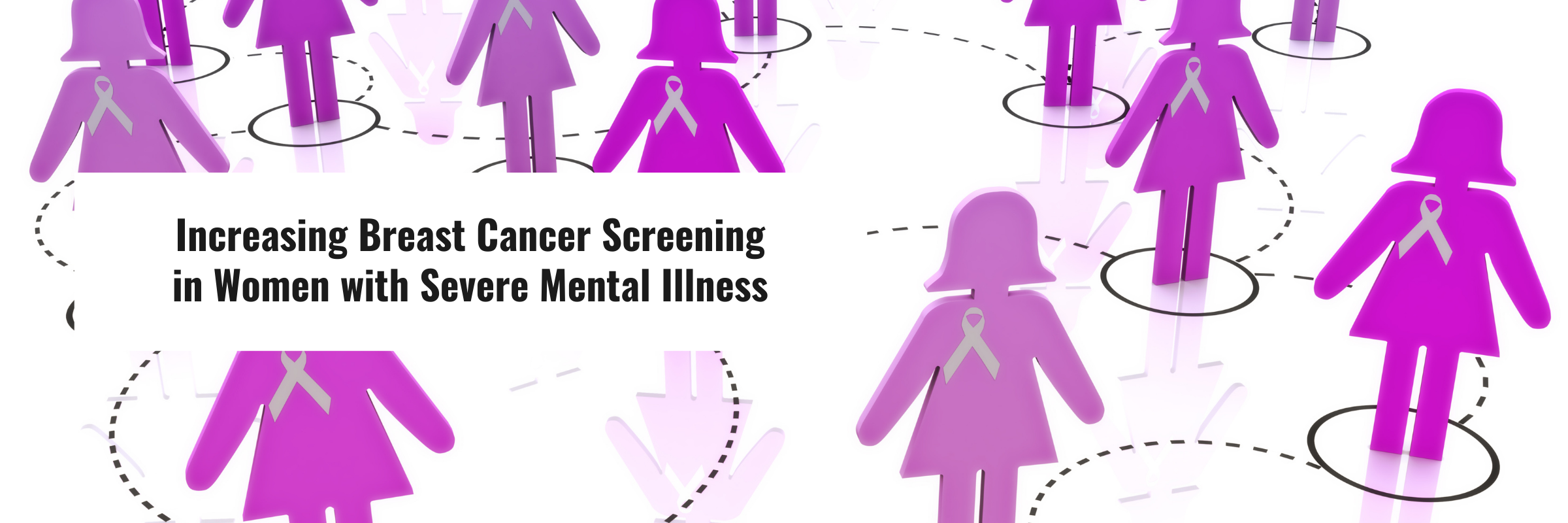
Summary
Individuals with serious mental illness (SMI) have more difficulty accessing health care and tend to die some 10 to 30 years earlier than the general U.S. population. Additionally, women with SMI have an increased breast cancer risk, and higher breast cancer mortality rates. Although mammography is an acknowledged strategy for early breast cancer detection, women with SMI are 32% to 50% less likely to have regular screenings. We have been addressing this healthcare disparity through a participatory action research and budgeting project with our community partner, Jewish Family Services of Atlantic and Cape May Counties, whose Women’s Health Network Program is the only community-based program in New Jersey that has successfully focused on breast cancer outreach, education, and screening for women with SMI. We created a Community Advisory Board with South Jersey breast and mental health experts, interviewed women with serious mental illness about the barriers and facilitators to breast cancer screening, and interviewed women with serious mental illness who have had a diagnosis of breast cancer, to better understand their experience of follow up and treatment.
Researchers and Partners
| Sheila Linz, PhD, PMHNP-NP, RN | Primary Investigator | Assistant Professor, Rutgers Camden School of Nursing |
|---|---|---|
| Bonnie Jerome-D'Emilia, PhD, MPH, RN | Co-Investigator | Associate Professor, Rutgers Camden, School of Nursing |
| Adam Okulitz-Kozaryn | Co-Investigator | Associate Professor, Camden College of Arts and Sciences |
| Sharon Simon | Community Partner | Rothenberg Center for Family Life Coordinator, Jewish Family Services |
About this Project
Initial Approach
 This research came together as a combination of the investigators’ research interests. We have individually studied people with mental illness, health disparities, and low-income women’s experiences with breast cancer screening and treatment. Because breast cancer is the most prevalent form of cancer in women with serious mental illness, and this population is 30% less likely than the general population to be screened, we wanted to study the ways in which this disparity could be mitigated. We know this population is less likely to be screened for breast cancer, but we don’t know why. In depth interviews with women with SMI will help us elucidate the barriers and facilitators to breast cancer screening among women SMI and we will also glean suggestions from the very women who face this challenge on how to better facilitate the screening process for them. Based on our research, other than what is provided by our community partner, there are no outreach programs for mentally ill women around issues of breast cancer in New Jersey, nor does the literature provide us with definitive answers.
This research came together as a combination of the investigators’ research interests. We have individually studied people with mental illness, health disparities, and low-income women’s experiences with breast cancer screening and treatment. Because breast cancer is the most prevalent form of cancer in women with serious mental illness, and this population is 30% less likely than the general population to be screened, we wanted to study the ways in which this disparity could be mitigated. We know this population is less likely to be screened for breast cancer, but we don’t know why. In depth interviews with women with SMI will help us elucidate the barriers and facilitators to breast cancer screening among women SMI and we will also glean suggestions from the very women who face this challenge on how to better facilitate the screening process for them. Based on our research, other than what is provided by our community partner, there are no outreach programs for mentally ill women around issues of breast cancer in New Jersey, nor does the literature provide us with definitive answers.
Evolution and Change
 This was designed as a mixed methods study with focus groups composed of breast and mental health experts and individual interviews with women served by JFS. We created a Community Advisory Board (CAB) composed of breast and mental health experts in South Jersey. We met three times thus far, the last meeting was remote. We conducted focus groups in person, but due to the COVID-19 pandemic, we were not able to interview the women with serious mental illness in person as originally planned. We received approval from the IRB in August to conduct fifteen individual interviews by telephone. The interviews lasted from 50 minutes to an hour and were in-depth with the participants fully engaged by this data collection method.
This was designed as a mixed methods study with focus groups composed of breast and mental health experts and individual interviews with women served by JFS. We created a Community Advisory Board (CAB) composed of breast and mental health experts in South Jersey. We met three times thus far, the last meeting was remote. We conducted focus groups in person, but due to the COVID-19 pandemic, we were not able to interview the women with serious mental illness in person as originally planned. We received approval from the IRB in August to conduct fifteen individual interviews by telephone. The interviews lasted from 50 minutes to an hour and were in-depth with the participants fully engaged by this data collection method.
Because the CAB discussions pin-pointed a lack of follow up care after a diagnosis of breast cancer in this population as a problem, we submitted another modification to the study and have thus far interviewed seven women with serious mental illness who have had a breast cancer diagnosis to better understand their experience of breast cancer diagnosis and treatment.
 Unfortunately, due to COVID-19, JFS lost funding used for their breast health program to facilitate breast cancer screenings for women with mental illness. However, we are using the participatory budgeting aspect of the grant to facilitate breast cancer screenings through incentives, such as gift cards, transportation, and education and coordination of screening programs in concert with various mental health and substance abuse facilities in the Atlantic City area. At the suggestion of the CAB we also created two PowerPoint presentations, one for healthcare providers and one for women with mental illness to be used as educational tools to shed light on the issue and discuss preliminary findings. These PowerPoint presentations will be disseminated through the CAB to breast and mental health providers throughout South Jersey.
Unfortunately, due to COVID-19, JFS lost funding used for their breast health program to facilitate breast cancer screenings for women with mental illness. However, we are using the participatory budgeting aspect of the grant to facilitate breast cancer screenings through incentives, such as gift cards, transportation, and education and coordination of screening programs in concert with various mental health and substance abuse facilities in the Atlantic City area. At the suggestion of the CAB we also created two PowerPoint presentations, one for healthcare providers and one for women with mental illness to be used as educational tools to shed light on the issue and discuss preliminary findings. These PowerPoint presentations will be disseminated through the CAB to breast and mental health providers throughout South Jersey.
Our next step is the creation of three podcasts, one for breast health staff, one for mental health staff, and one for women with mental illness, to give voice to women diagnosed with SMI who must navigate the health care system to pursue preventive health care, and to illuminate the issues this population faces through interviews with experts in breast and mental health care.
Results and Findings
The data are still being analyzed. Preliminary findings following the in depth interviews are that there are multiple barriers that hinder the utilization of mammography screening, some of which are consistent with studies of low income and uninsured women and some of which are specific to this population including: stigma, substance abuse, perceived disrespectful or rough treatment from healthcare providers, lack of trust in health care providers, and the preponderance of mental health symptoms that may result in severe mood shifts, depression, and/or anxiety that make scheduling and follow up of appointments almost impossible.
Facilitators are having mental health providers encourage dialogue about breast cancer screening, the use of counselors to facilitate screening by making appointments or going with the women to appointments, as well as the provision of social support for screening, the use of incentives and mobile mammography vans, and the connection of self-care to self-esteem.
Next Steps
Dissemination
We will work with staff at JFS to incorporate changes as suggested by the study participants and determine how best to manage the program in case of persistent lack of external funding. We will disseminate the findings through publications, presentations and the development and dissemination of educational podcasts.
Exploring a model of care
We hope to create a model of care for women with serious mental illness to receive breast cancer screening that could be replicated at other mental health care agencies and breast cancer clinics throughout the state. Furthermore, we hope to continue this area of study through the receipt of foundation or government funding.
